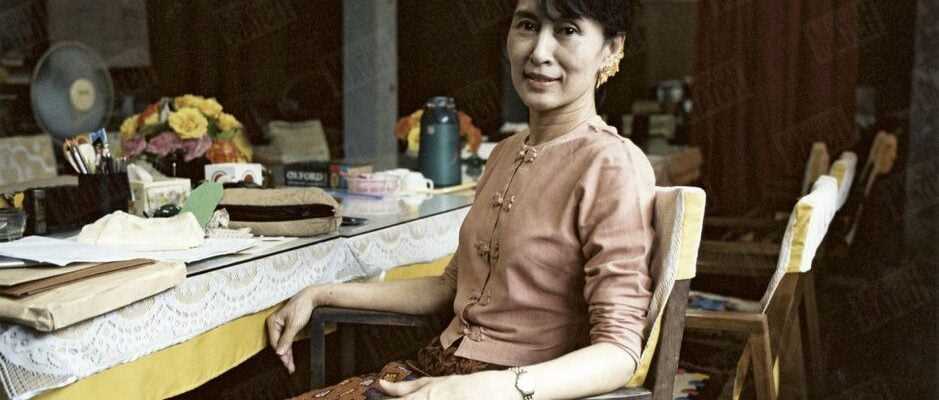Symbol of democracy then pariah on the international scene, it is now a target in the hands of the Burmese army. Nobel Peace Prize winner in 1991, “the Lady of Rangoon” fell out of favor in 2017 for having come to terms with her former executioners of the military junta by not condemning the massacre of the Rohingya Muslim minority. Reversed in February, indicted on multiple occasions in recent months, sentenced in December and once again this Monday, January 10, 2022, the former head of government risks, at 76 years, more than one hundred years in prison. A look back at a tumultuous destiny made up of fights and sacrifices, contradictions and about-faces.
A first verdict against Aung San Suu Kyi was delivered on Monday, December 6, 2021, in the dismal setting of the court of Naypyidaw, the puppet capital of Burma which is populated only by soldiers and proto-civil servants, affiliated to the junta. A second verdict fell on Monday, January 10, 2022. More are to come. Aung San Suu Kyi’s enchanted break at the helm of the country from 2016 to 2021 is definitely over. The army, led by General Min Aung Hlaing, 65, has called the end of democratic recess. Since the coup d’état of February 1, 2021, he has been repressing in blood (1300 civilians killed) the last square of the faithful of “our Lady of Burma” alias “the Lady” or “The Lady”.
On the rare images of the trial broadcast by official channels, the 76-year-old pasionaria appeared combative, with haughty bearing and serious face. Beatified during her lifetime thanks to her fight for democracy, before her banishment in 2017 and her guilty silence on the massacre of the Rohingya Muslim minority, she did not flinch at the wording of her sentence: four years in prison for inciting disorder against the army and violating the restrictions related to Covid-19. A sentence commuted to two years’ imprisonment after a partial pardon from the head of the junta.
To read : When Aung San Suu Kyi confided in Match
For many, in Burma, she remained the icon of progress that challenged the military
The Stations of the Cross have barely begun. Prosecuted on other charges, such as violating the Official Secrets Act and the Anti-Corruption Act, “the Lady” will face eleven criminal cases, with maximum sentences totaling over one hundred years if passed. consecutively. “His conviction is the culmination of a nearly one-year process aimed at discrediting a democratically elected leader in order to consolidate the military regime,” comments David Mathieson, a fine analyst for various NGOs in a country where he has lived for twenty years. -five years. Seen from Europe or the United States, Suu Kyi may have been a broken icon, but for many in Burma she was still an icon of progress and defiance against the military.
“The Lady” will remain under house arrest in a government establishment in Naypyidaw. Where and under what conditions? Will she be treated like an average prisoner in a crowded cell or with privileges in a VIP villa? Mystery.
Daughter of the supporter of independence, General Aung San, assassinated when she was only 2 years old, Aung San Suu Kyi returned to Burma in 1988 to take care of her aging mother. During his first public intervention in front of the Shwedagon Pagoda, iconic monument of Yangon, “the girl of whom you know”, his favorite understatement, gathered a huge crowd. In September 1988, she created a new party, the National League for Democracy (LND). The rest is known: arrest, house arrest in Rangoon for twenty years before his release in 2010, his conquest of power and his brutal eviction ten months ago.
Discover Retro Match, news through the Match archives …
“
For the military, ending Suu Kyi’s political career was the main reason for the coup
“
The information on his trial only filtered in droplets, in order “not to destabilize the public peace”, according to the army. “For the military, ending Suu Kyi’s political career was the main reason for the coup,” explains David Mathieson.
The NLD, which won the 2020 election, has been dismantled by arrests and imprisonment. Many of its members have taken up arms and launched an urban guerrilla war in most of the major cities. Not a day goes by without a confrontation where the army fires live ammunition at the crowd. The junta can no longer control the country except through this mixture of brute force, police repression, bureaucratic control and the economic desperation of the people who, it hopes, will seek to survive rather than resist.
For any questions about our photos, back issues and special issues, consult our services …
Any reproduction prohibited
